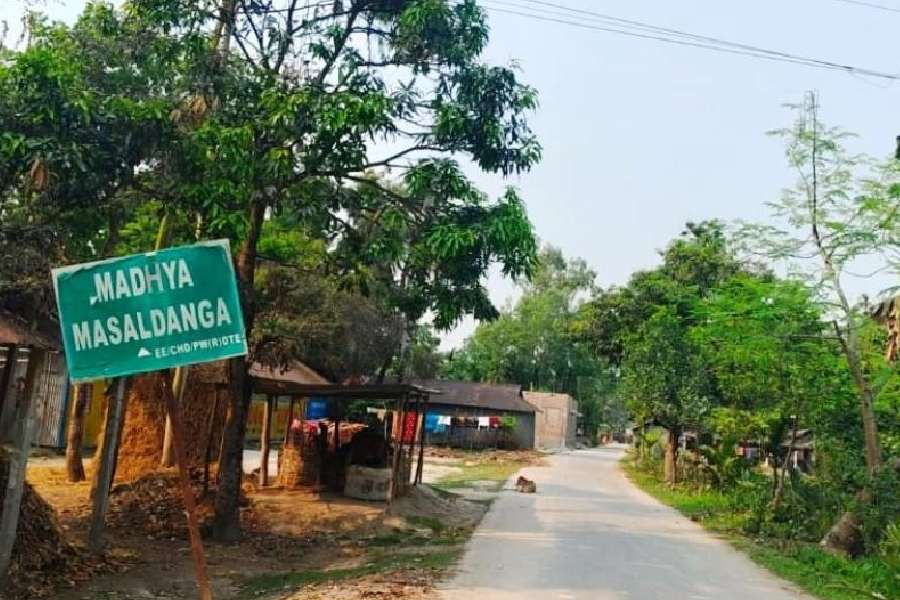Saddam Hossain, a man in his early 30s from Cooch Behar, is worried about the special intensive revision of the electoral rolls in Bengal, because his name was first included in the voter list in 2015.
Until July 31, 2015, Saddam was a Bangladeshi living in Madhya Mashaldanga, one of the 51 former Bangladeshi enclaves — Bangladeshi villages landlocked within India — that are now part of India.
“Under the Land Boundary Agreement (LBA) signed between India and Bangladesh, our enclaves became Indian villages. Our names were added to the electoral rolls as we, too, became Indian citizens. We were provided with other documents as well,” Saddam said.
“Now, if we are asked to produce older Indian documents or the names of our parents from the 2002 electoral rolls…. None of us has such records, since we were Bangladeshis at the time. This new exercise (SIR) has left all residents of the former enclaves worried.”
While 51 Bangladeshi enclaves merged with India at midnight on July 31, 2015, some 101 Indian enclaves merged with Bangladesh.
The residents of these enclaves were given two options: Accept citizenship of the other country or return to your homeland. While none of the 16,000-odd Bangladeshis from the 51 enclaves opted to return, around 950 Indians from the Indian enclaves in Bangladesh moved back to India.
All of those who opted to live in India were rehabilitated and provided with voter I-cards and other documents by the district administration.
“We have voter IDs, Aadhaar, PAN and ration cards, but all these were issued after July 2015,” said Jainal Abedin, another youth from Madhya Mashaldanga.
“We have been worried since the announcement of the SIR because all that we possess (from among the 11 categories of documents listed by the Election Commission) are old Bangladeshi documents relating to our ancestral land. We hope the Election Commission considers the LBA and our situation carefully.”
Jainal underscored another concern: Many women from these former enclaves have married and shifted to other villages. So, if the poll panel makes some concessions for the residents of the former enclaves, will those be extended to these women?
“If they are asked to produce old documents or their parents’ names from the 2002 electoral rolls, they can’t do so. Some had married before July 2015, when our enclaves merged with India. Their parents and relatives are equally worried,” Jainal said.
Residents of another former Bangladeshi enclave, Batrigach in Dinhata-I block, are anxious, too. They said a joint census was conducted in 2011 by India and Bangladesh in these 51 enclaves as a preparatory measure before the LBA’s implementation.
“A section of Batrigach residents had migrated to other (Indian) states to find work before 2011. Although they later received voter I-cards and other documents, their names do not appear in the joint census,” Raushan Sarkar, a local youth, said.
“If the SIR considers the 2011 joint census, what will happen to these people?”
Sarkar emphasised the need for a clear guidance from the administration. “Some of us, especially the elderly, fear being pushed back into Bangladesh,” he said.
District Trinamool leaders, aware of the LBA and the citizenship granted to the former Bangladeshi enclave residents, echoed these concerns.
“The Election Commission recognises 11 types of documents as valid for SIR. However, most of the residents of these former enclaves possess none of these,” said Parthapratim Roy, former MP and Trinamool spokesperson in the district.
“The Election Commission should consider their case separately to shield them from harassment.”
Letter to EC
A migrant workers’ body, the Parijayee Shramik Aikya Manch (Migrant Labourer Unity Forum), wrote to the Election Commission on Thursday seeking special provisions in the SIR for residents of the former Bangladeshi enclaves.
“1. Formulate special verification guidelines for the residents of the former enclaves, taking into account their unique historical and administrative circumstances,” the letter says.
“2. Accept alternative documents — such as 2015 Land Boundary Agreement records, certificates issued by local administration, and panchayat residency proofs — as valid evidence of Indian citizenship.
“3. Ensure that no genuine Indian citizen is deprived of their constitutional right to vote due to the unavailability of old documents.”
The letter outlines the difficulties that people from these former enclaves face a decade after the merger with India, saying several migrant labourers from among them were “allegedly harassed merely for speaking in Bengali in Delhi”.











